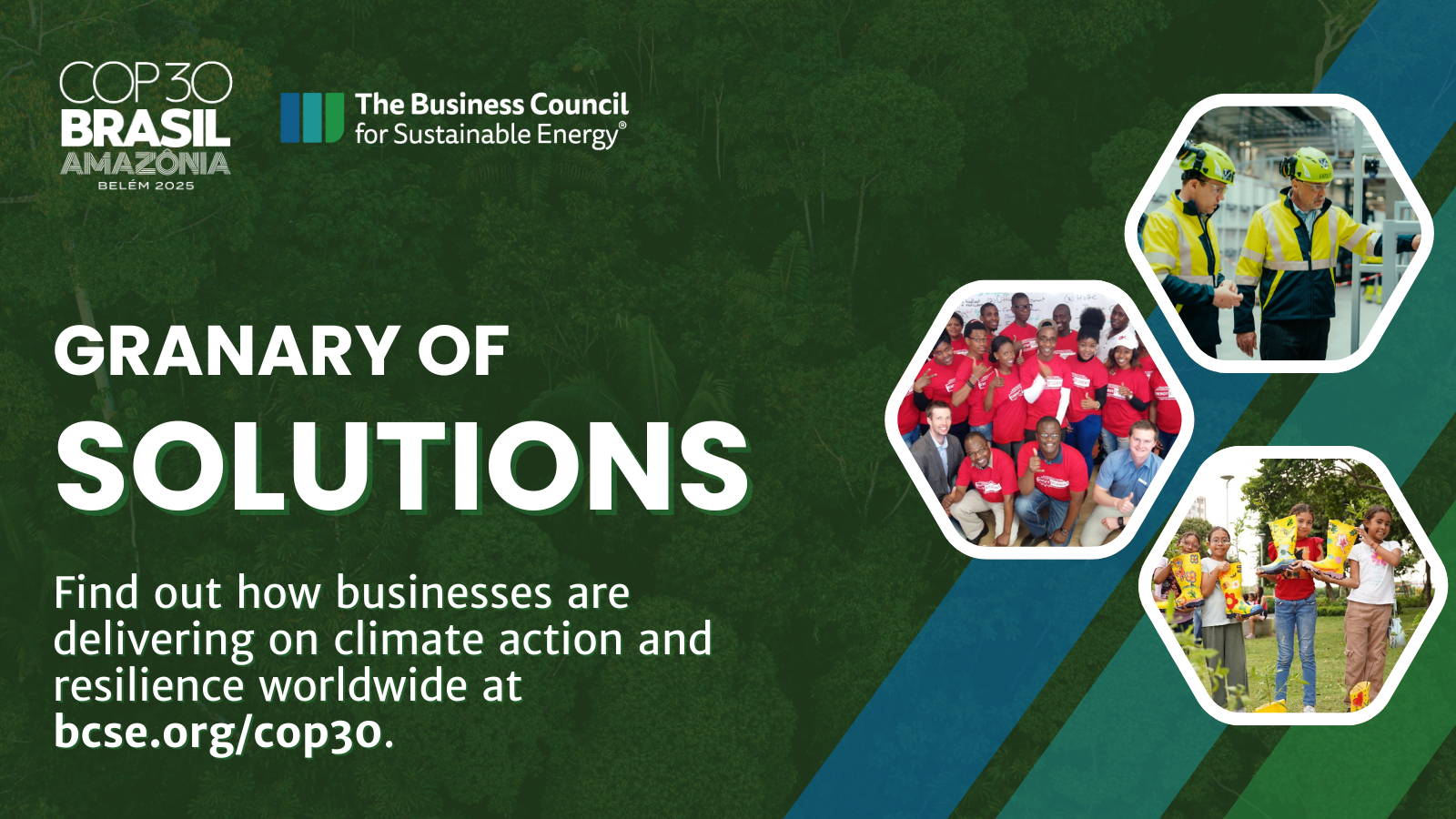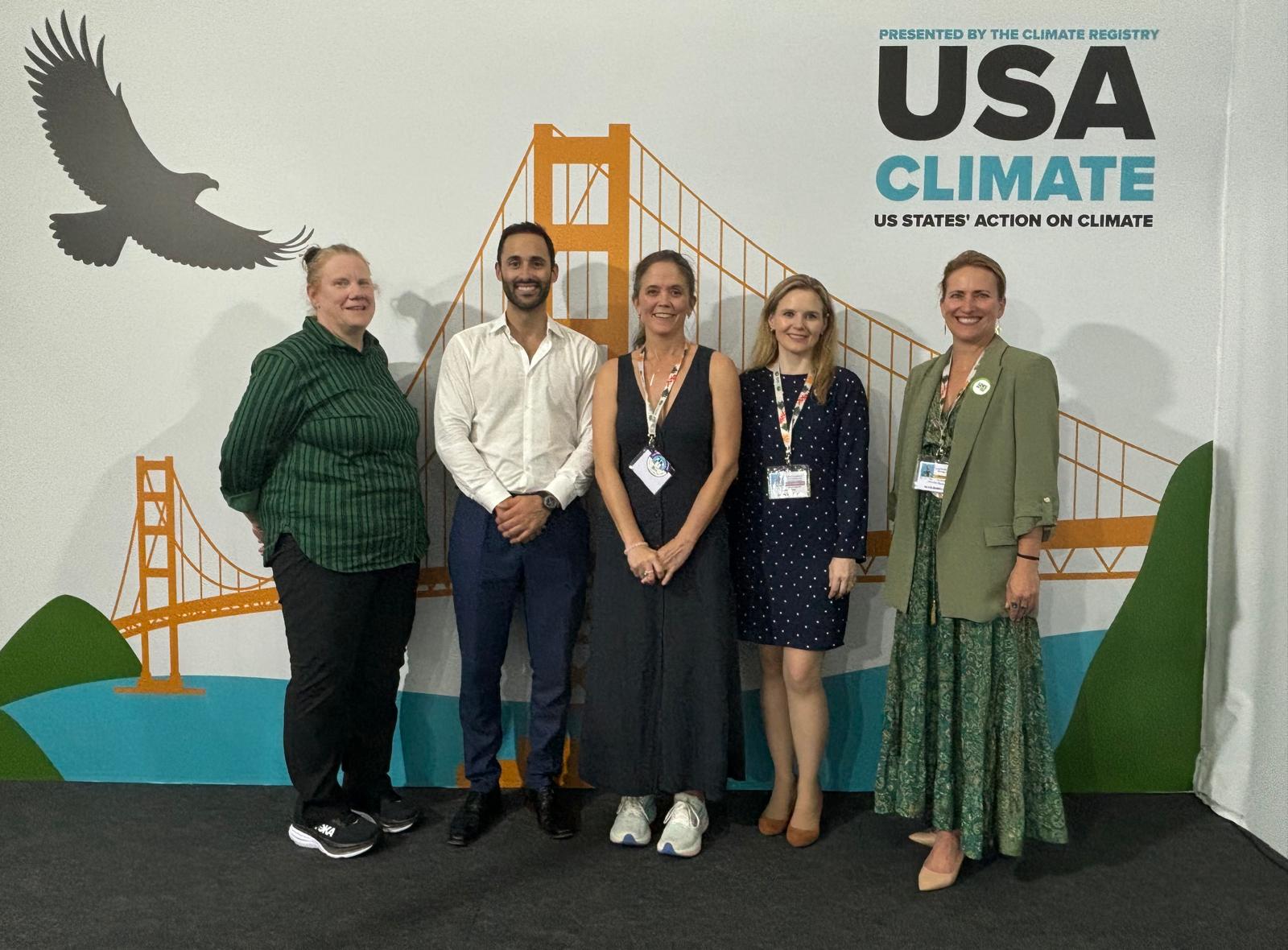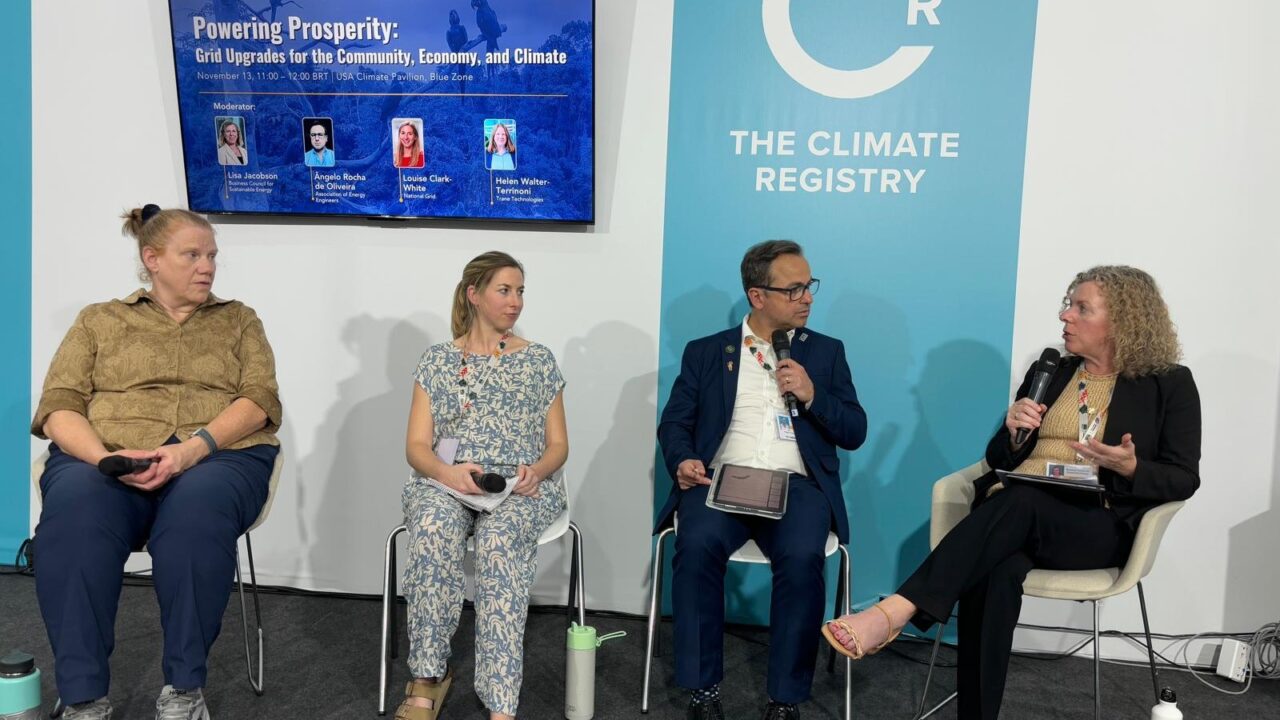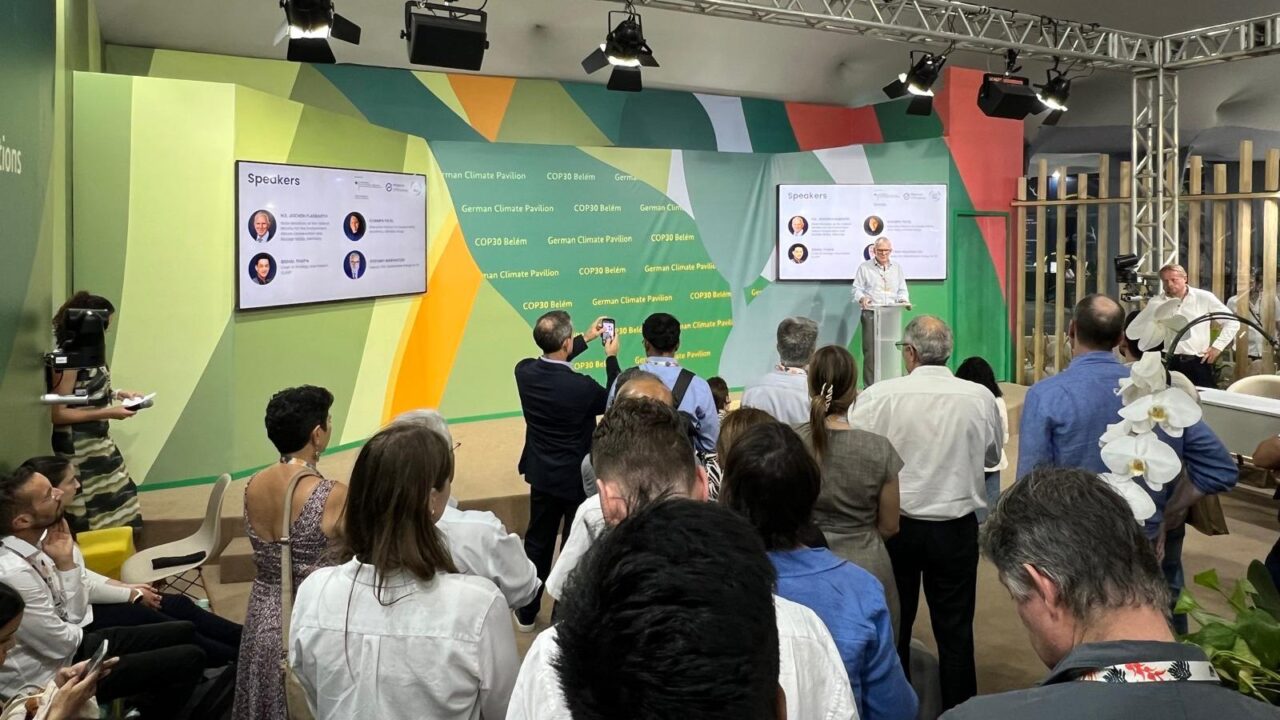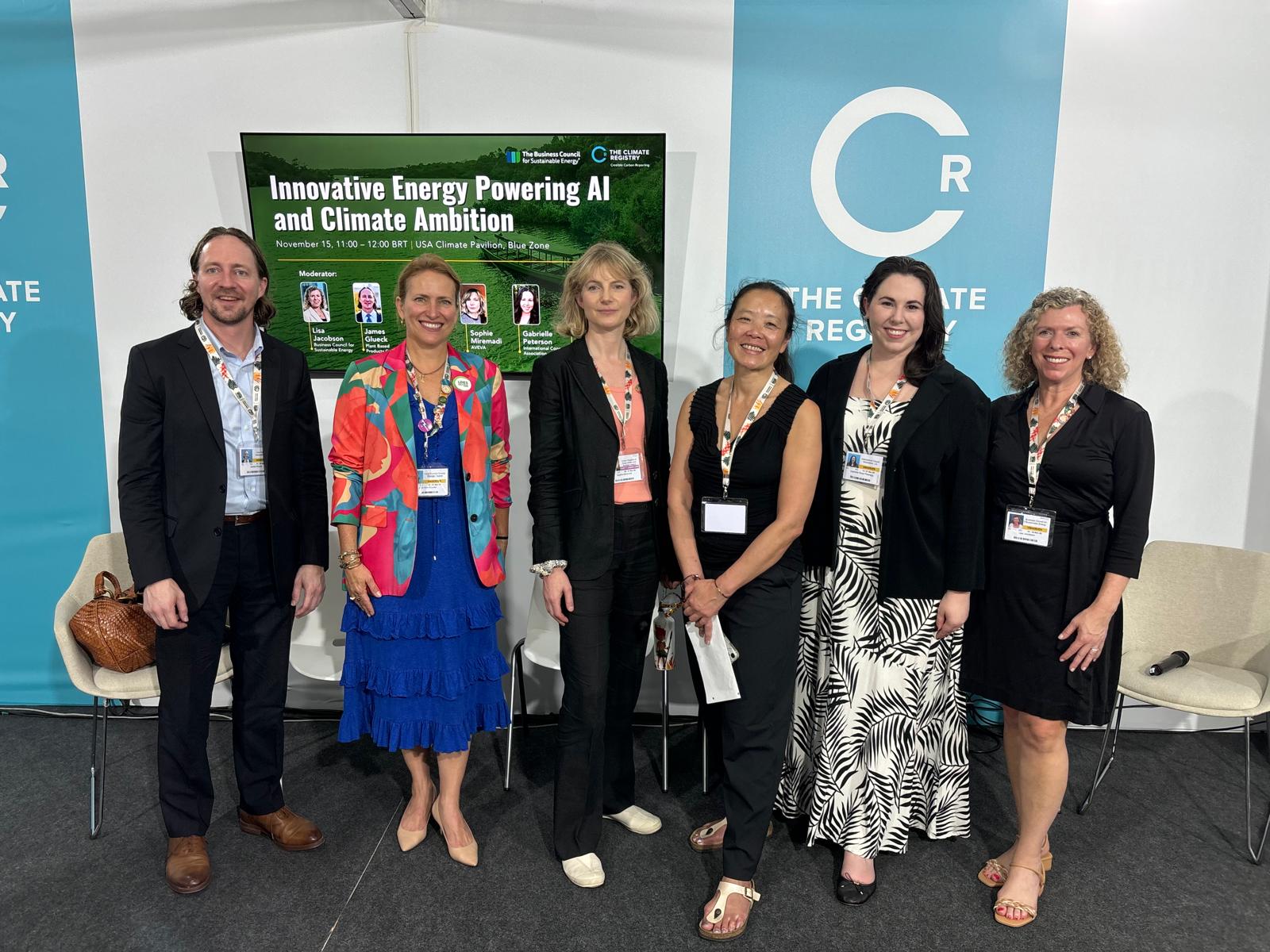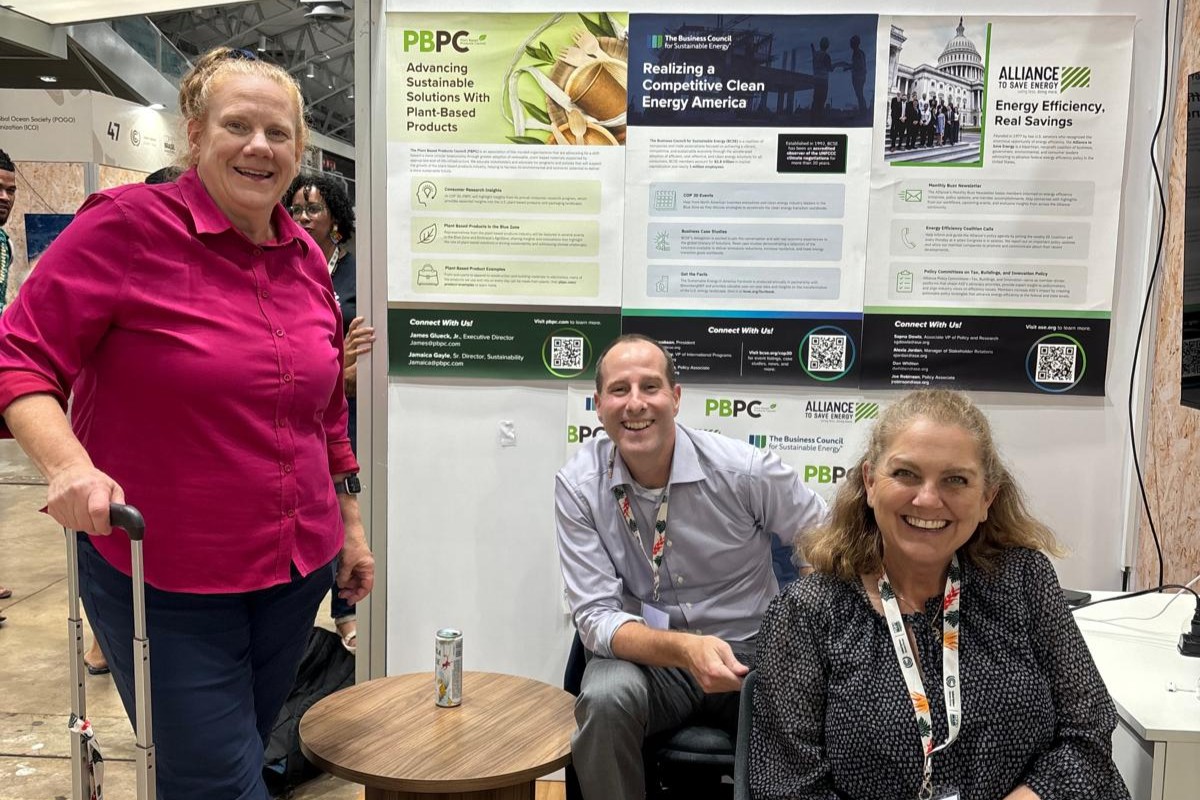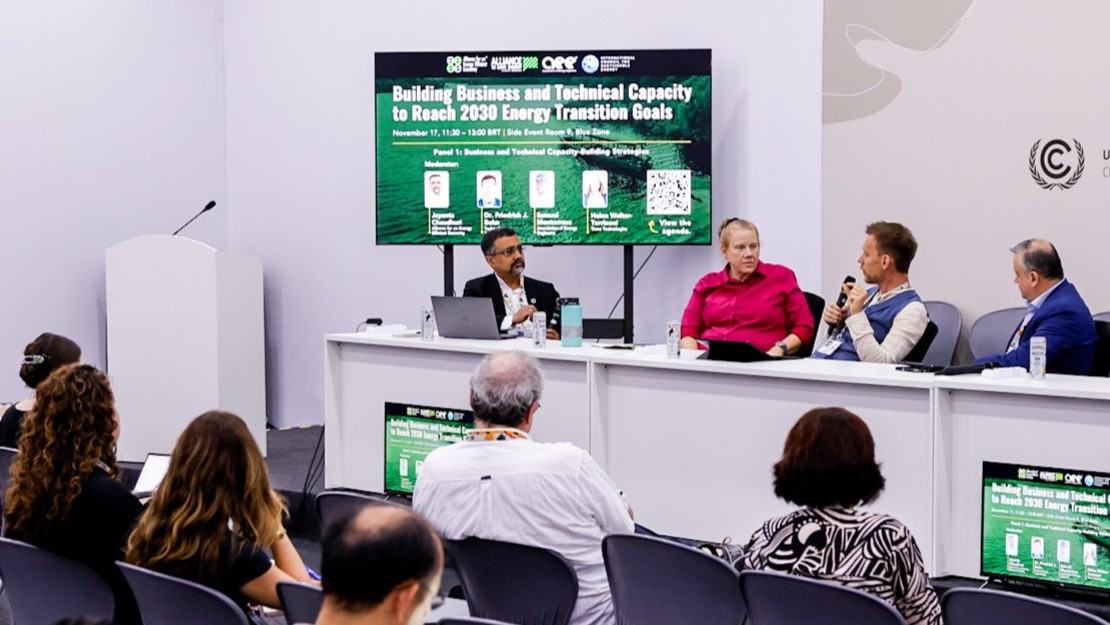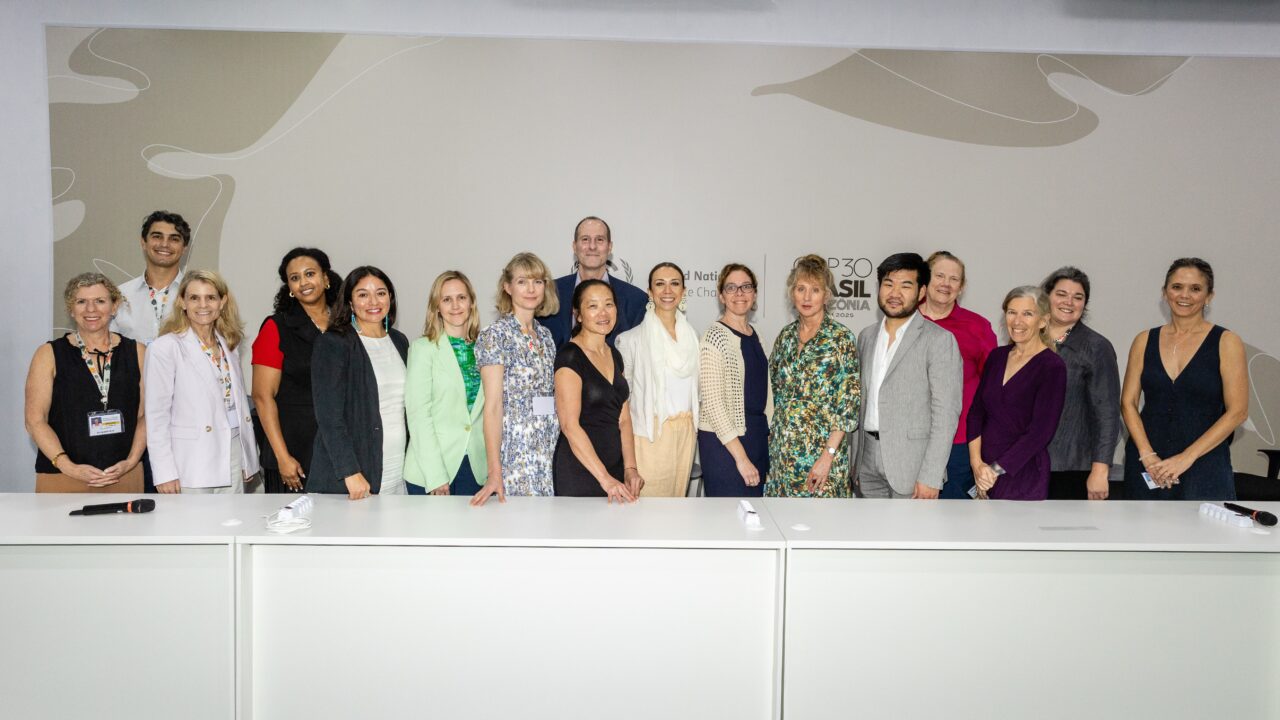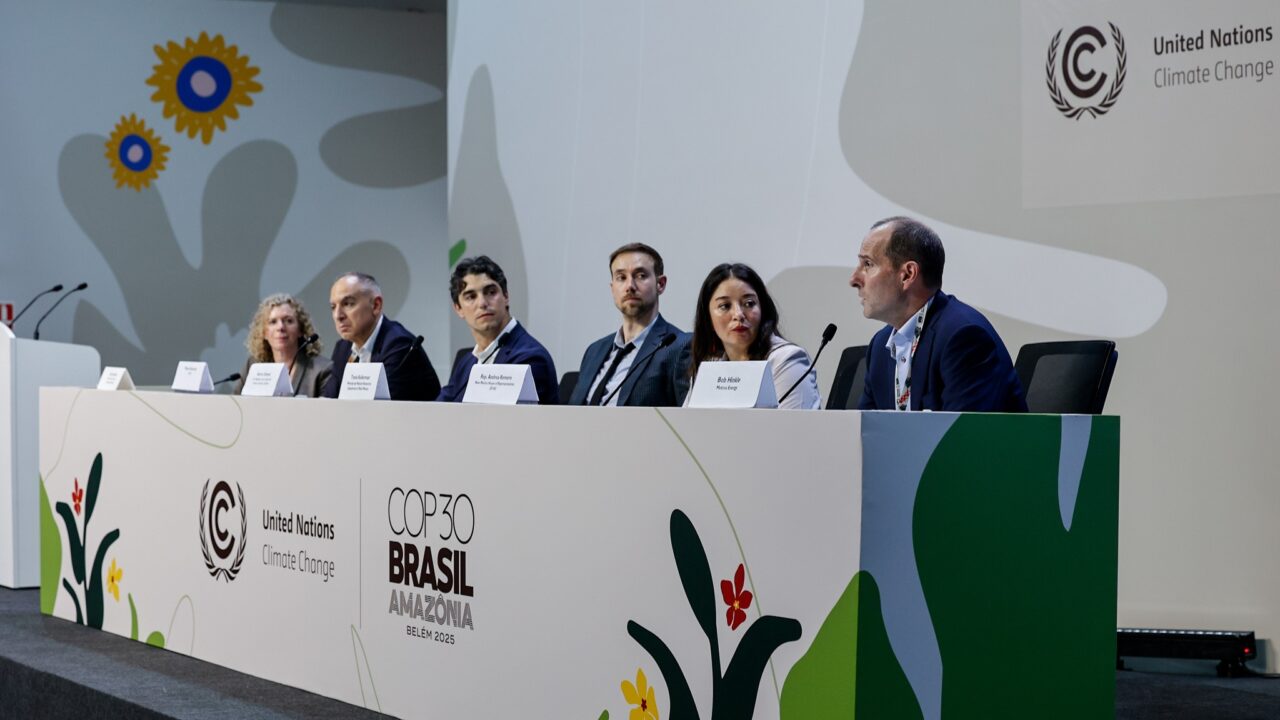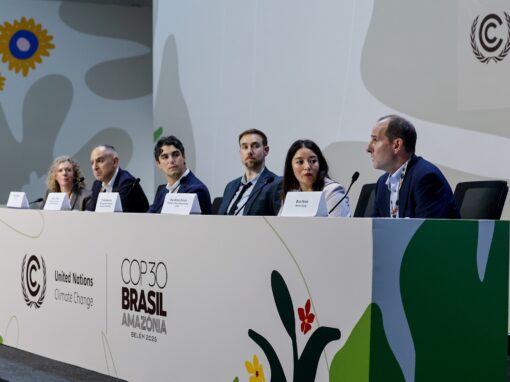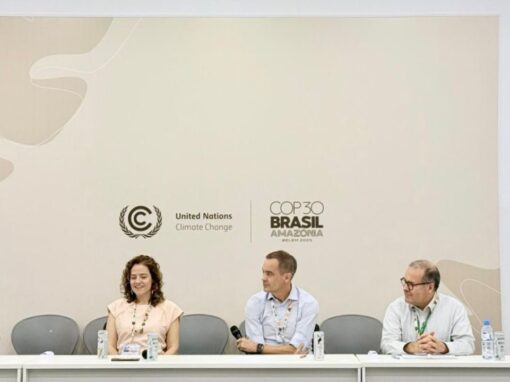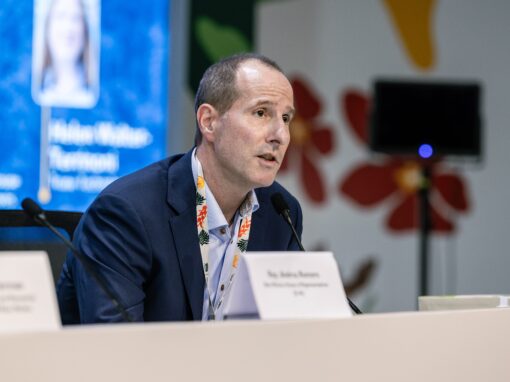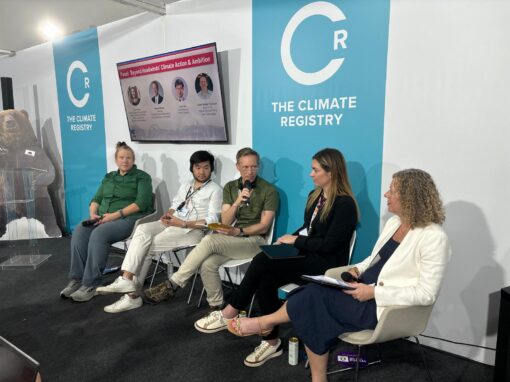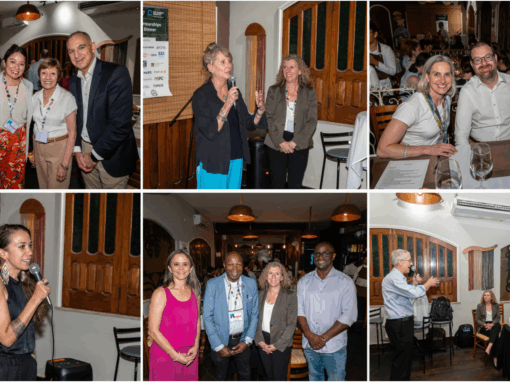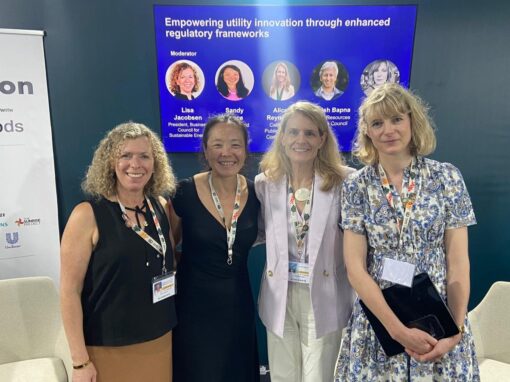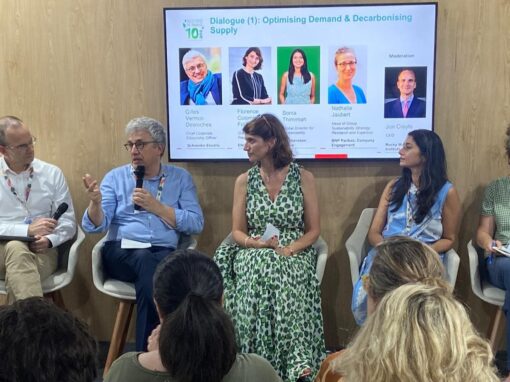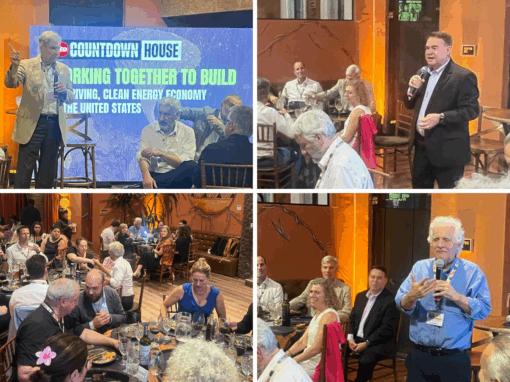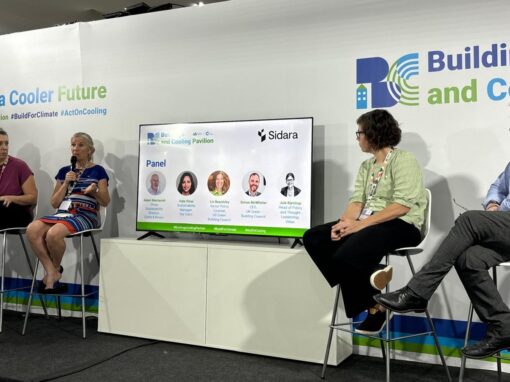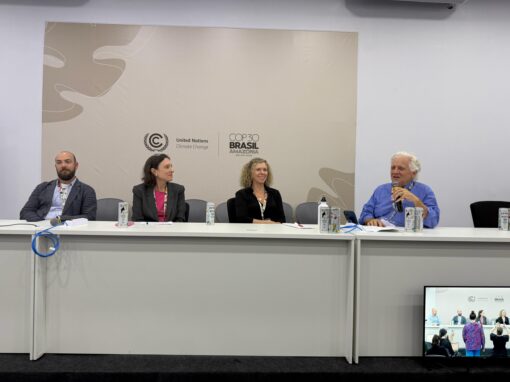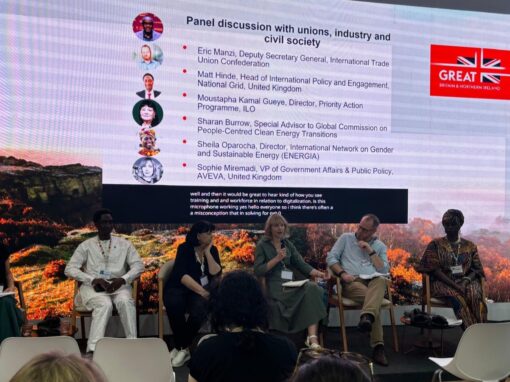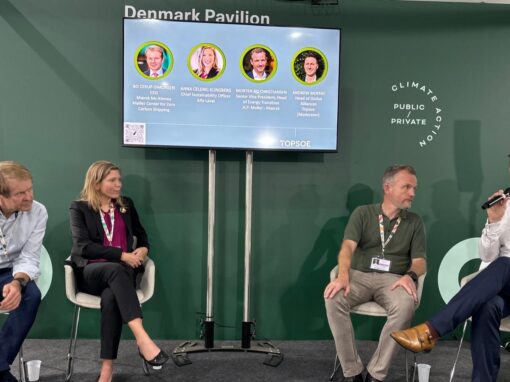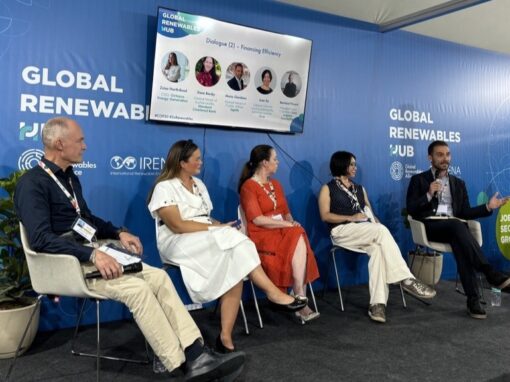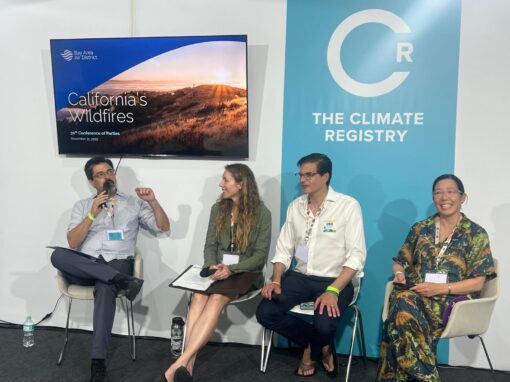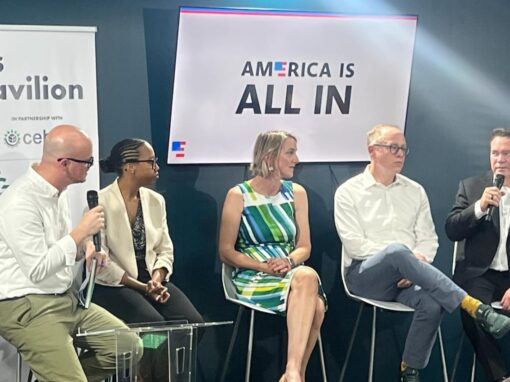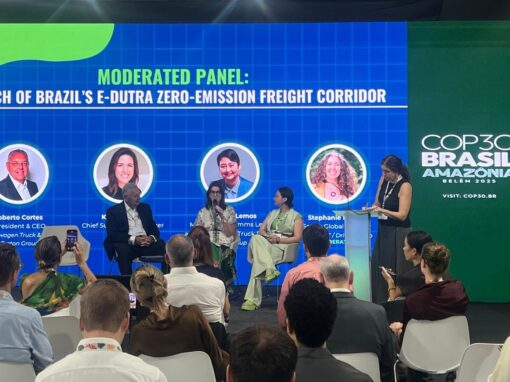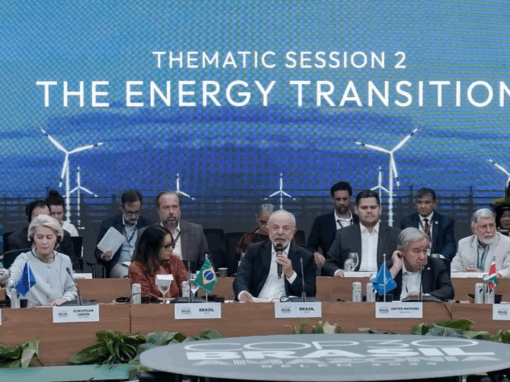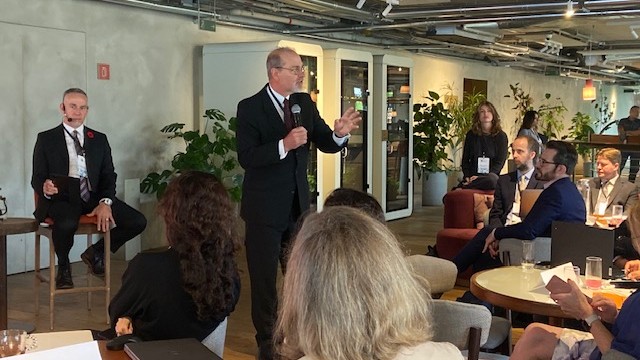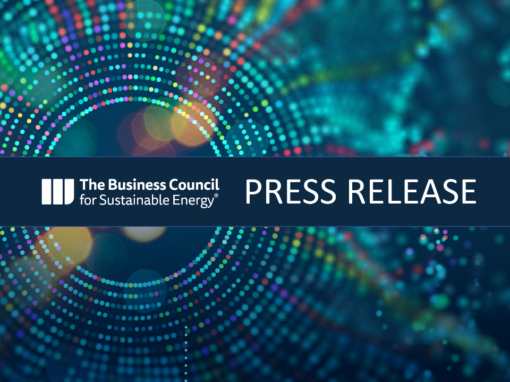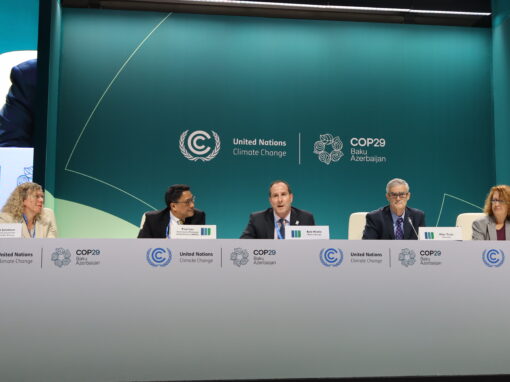Delivering Solutions. Unlocking Ambition. Accelerating Deployment.
The Business Council for Sustainable Energy at COP 30
Delivering Solutions. Unlocking Ambition. Accelerating Deployment.
The Business Council for Sustainable Energy (BCSE) – a coalition of companies and trade associations that deploy clean energy and decarbonization solutions, with a sector focus on energy efficiency, natural gas, and renewable energy – joins the 30th Conference of the Parties (COP 30) to the United Nations Framework Convention on Climate Change in Belém, Brazil. BCSE brings a delegation of executives from the private sector that innovate, finance, and deploy technology solutions and systems that reduce greenhouse gas emissions, enhance resilience, and drive economic growth. BCSE’s COP delegation includes executives from the energy efficiency, energy storage, renewable energy, sustainable transportation, and emerging decarbonization technology industries.
BCSE’S Commitment to the Energy Transition and Climate Action
In line with the COP 30 Presidency’s call for a global mutirão, BCSE is bringing forward credible solutions, partnerships, investments, and ideas to accelerate the energy transition and also decarbonize the agriculture, buildings, industry, and transportation sectors. Learn more about BCSE’s COP 30 objectives in our position paper.
Download the COP 30 Position Paper
Frequently Asked Questions
Who is in the BCSE delegation to COP 30?
See this list of more than 20 companies, organizations, and partners that are a part of BCSE’s delegation to COP 30.
What are BCSE’s objectives for COP 30?
At COP 30, the BCSE coalition is committed to work with governments, businesses, and stakeholders to:
Deliver Solutions
- Foster dialogues about best practices for accelerated deployment of energy efficiency and clean energy solutions, including opportunities and obstacles.
- Bring forward BCSE members’ implementation experience and expertise to the COP 30 Granary of Solutions.
- Champion the need for policy and market certainty to attract investment and foster collaboration.
Unlock Ambition
- Encourage countries to close the finance gap by demonstrating business support for continued and increased climate ambition.
- Identify ways to optimize public and private international finance flows, especially towards those most vulnerable to climate impacts.
Accelerate Deployment
- Continue to build momentum and highlight how countries can work with the private sector to:
- double the global rate of energy efficiency improvements by 2030
- triple renewable energy capacity globally by 2030
- increase global energy storage to 1.5 terawatt hours by 2030
- accelerate methane emissions reductions
- reduce road transport emissions
- build net-zero emissions systems by mid-century
- increase the production and use of sustainable fuels by 2035
Learn more in BCSE’s COP 30 position paper.
Why does BCSE attend the annual Conference of the Parties (COP)?
Established in 1992 in advance of the first Earth Summit or United Nations Conference on Environment and Development (UNCED), BCSE has been an accredited business observer to the United Nations for more than 30 years.
BCSE has led a delegation to each of the three UNCED Summits (1992, 2002, 2012) and has had a presence at nearly all the United Nations Framework Convention on Climate Change (UNFCCC) annual Conference of the Parties (COP) sessions and most inter-sessional meetings.
BCSE attends the COP with these guiding objectives to:
- Ensure a broad portfolio of decarbonizing energy efficiency and clean energy solutions are utilized to close the global emissions gap and to meet national mitigation and adaptation goals.
- Share implementation experiences, challenges, and opportunities – from community engagement to technology deployment – with governments and stakeholders.
- Discuss the important role of policy certainty, market-based mechanisms, finance, capacity building, technology transfer, monitoring, reporting and verification, and partnership with the private sector to foster greater climate action.
Businesses in the BCSE delegation are deploying the energy efficiency and clean energy solutions needed to reduce energy demand, accelerate the energy transition, and keep global temperature rise below 1.5°C. Business voices are needed at COP to provide insight from the real economy on what policies best catalyze investment and deployment.
What is a typical day-in-the life at COP for BCSE?
The day for BCSE begins with preparation and review of the latest news out of COP and the UNFCCC Daily Program, as well as a check-in at the daily business and industry NGO (BINGO) briefing hosted by the International Chamber of Commerce to get oriented for the day.
Throughout the two weeks of COP, BCSE’s delegation works to support the international negotiations by advocating for ambitious global commitments to advance the clean energy transition, and demonstrating to countries and civil society the solutions the private sector can provide. Members of BCSE’s delegation provide energy efficiency, clean energy, and decarbonization technologies and services that help countries and communities reduce global greenhouse gas emissions, increase resilience, and meet their climate action goals. Learn more about BCSE’s advocacy objectives at COP 30 here.
Although day-by-day schedules vary, BCSE’s delegation engages in this advocacy at COP by:
- Meeting with national and sub-national governments to share the importance of using policy tools to broaden the market for clean energy. Demonstrate how the private sector can help the public sector achieve its climate mitigation and adaptation goals.
- Meeting with U.S. and international civil society stakeholders to listen and learn and to identify ways to work together to accelerate the energy transition.
- Convening global clean energy advocates to discuss strategies for advancing the clean energy transition.
- Connecting our members to share their business views at side events, exhibits, press conferences, and other events held in the blue zone.
- Attending conferences held outside of the blue zone to network and share our views.
What is the energy transition?
The energy transition is an economic opportunity to shift how we generate and consume energy from high-emission to low- and zero-emission resources. The energy efficiency and clean energy technology solutions needed to do so are available today.
BCSE advocates for the deployment of a broad portfolio of solutions that can be adjusted for regional or local circumstances. We are in a critical stage of implementation – of aligning market and policy signals to deploy and build a positive feedback loop that ensures both political and public support for greater investment and growth.
The tricky part is that the transition takes time. The good news is that the pace is picking up, even though some may feel it is not fast enough. The reality is that all energy sources need to adapt and evolve if we are to meet our shared decarbonization goals. Communities that are impacted need to be involved in the planning and implementation of the transition. The private sector cannot go it alone.
BCSE works through its advocacy to share the realities of the various layers of the energy transition that need alignment. BCSE’s annual and free publication produced with BloombergNEF, the Sustainable Energy in America Factbook, chronicles the pace of the transition in the United States over the past decades.
What are nationally-determined contributions (NDCs) and why do they matter to the energy transition?
Throughout 2025, countries are updating their Nationally Determined Contributions (NDCs) under the Paris Agreement, which include economy-wide emissions reduction targets for 2035. To date, only 62 of nearly 200 countries – representing 31% of global emissions – have submitted updated NDCs.As targets are announced, a clear gap between countries’ current levels of ambition and the reductions needed to stay on a 1.5°C trajectory is more notable.
According to ClimateWatch, the NDCs submitted so far would only reduce global emissions by roughly 1.4 GtCO₂e by 2035, relative to earlier pledges. Additional emissions reductions of between 26.5–29.8 GtCO₂e by 2035 would be necessary to limit warming to 1.5°C.
As the 30th Conference of the Parties (COP 30) to the United Nations Framework Convention on Climate Change (UNFCCC) in Brazil convenes this November, it is hoped that remaining countries will submit their updated NDCs. The level of collective ambition will likely be discussed throughout the two-week conference.
BCSE will be leading a delegation of U.S. businesses and organizations to COP 30 to showcase scalable, commercially available technology solutions that can help countries meet their climate targets and also scale greater ambition.
Why is international climate finance important to BCSE?
BCSE understands the central role that international finance flows – both public and private – play to advance international cooperation on climate and to deliver emissions reductions on the scale that science demands. The Baku to Belém Roadmap calls for significant private sector finance to help achieve its goal of mobilizing at least $1.3 trillion annually by 2035 for climate action in developing countries.
At home in Washington, DC, BCSE is a consistent advocate for the annual appropriations in the U.S. federal budget for international climate and clean energy programs.
BCSE greatly values the long-standing and important leadership role that the United States plays in the global community to support developing countries as they build public and private infrastructure that incorporates American values and generates American opportunities. These investments help to create an enabling legal, financial, and regulatory environment that is needed for U.S. companies to effectively enter and prosper in developing countries. This public finance strengthens U.S. credibility overseas and generates increased market demand for high quality American energy efficiency and clean energy solutions.
Granary of Solutions
In the spirit of the COP 30 Presidency’s call for a global mutirão – a collective effort to mobilize climate action – the Presidency launched its Granary of Solutions platform, showcasing a collection of sustainable solutions that demonstrate how the implementation of the Paris Agreement is taking place on the ground.
BCSE’s delegation is excited to join the conversation at COP 30 and add real economy experiences to the global Granary of Solutions. Visit BCSE’s Granary of Solutions webpage to find case studies demonstrating a selection of the solutions available to deliver emissions reductions, increase resilience, and meet energy transition goals worldwide.
Schedule of Events
BCSE In Action – News
BCSE Reflections: Local and Real Economy Action at COP 30
This year’s climate conference advanced implementation of the Paris Agreement through the launch of a multi-year action agenda and the Global Implementation Accelerator. Collaboration among more than 194 countries – alongside strong participation from U.S. subnational leaders – underscores a sustained global commitment to reducing greenhouse gas emissions and strengthening climate resilience. read more
COP 30 Launches New Era of Action in Support of Paris Agreement Goals
“Collaboration among more than 194 countries – alongside strong participation from U.S. subnational leaders – underscores a sustained global commitment to reducing greenhouse gas emissions and strengthening climate resilience," said BCSE President Lisa Jacobson. read more
Plant Based Products Council Discusses How Agriculture Is Delivering Practical Solutions for a Sustainable Future
Jamaica Gayle, Senior Director of Sustainability and Environmental Affairs, Plant Based Products Council joined an official UNFCCC side event yesterday to highlight agriculture’s essential role in advancing climate solutions. read more
Metrus Energy Discusses COP 30 on Energy Gang Podcast
Bob Hinkle, President and CEO of Metrus Energy, joined the Energy Gang podcast this week to share his perspective on the climate conference. read more
U.S. Climate Action Continues
BCSE President Lisa Jacobson emceed an event hosted by America Is All In today, featuring Helen Walter-Terrinoni, Director of Global Climate Policy, Trane Technologies alongside subnational and academic leaders. read more
BCSE Hosts Energy Partnerships Dinner
In partnership with The Climate Registry, BCSE hosted a dinner on Tuesday to celebrate energy partnerships. read more
Empowering Utility Innovation Through Enhanced Regulatory Frameworks
BCSE President Lisa Jacobson moderated a panel today at the We Mean Business Pavilion exploring the critical intersection of regulatory frameworks and utility innovation. read more
Optimizing Demand, Decarbonizing Supply With Schneider Electric
Gilles Vermot Desroches, Chief Corporate Citizenship Officer, Schneider Electric spoke at the French Pavilion last week, highlighting the need for optimization and flexibility in energy infrastructure. read more
Working Together to Build a Thriving, Clean Energy Economy in the United States
On Saturday night, BCSE hosted a dinner with the TED Countdown House and the SEEC Institute to bring together U.S. public and private sector leaders who are advancing energy, climate and economic progress at home. read more
U.S. Green Building Council Highlights Global Pledge on Healthy Indoor Air
At an event this week at the Buildings and Cooling Pavilion, Liz Beardsley, Senior Policy Counsel, U.S. Green Building Council spoke on the newly announced Global Pledge on Healthy Indoor Air. read more
Views of the United States: Domestic and International
At an official UNFCCC side event today, BCSE President Lisa Jacobson joined former U.S. lead negotiator Trigg Talley, Vanderbilt Professor Leah Dundon, and the SEEC Institute to share U.S. perspectives on the COP. read more
National Grid and AVEVA Discuss Advancing Just and Inclusive Energy Transition
Today at the UK Pavilion, Matt Hinde, Head of International Policy and Engagement, National Grid and Sophie Miremadi, VP of Government Affairs and Public Policy, AVEVA joined members of the Global Commission on People-Centred Clean Energy Transitions and other international stakeholders to share strategies for advancing just and inclusive clean energy transitions. read more
BCSE Breaks Down the COP 30 Negotiations on the Energy Gang Podcast
BCSE President Lisa Jacobson appeared on the Energy Gang podcast alongside Amy Myers Jaffe, Director of NYU’s Energy, Climate Justice, and Sustainability Lab; and Amy Harder, National Energy Correspondent at Axios. read more
Alongside UN Climate Summit, 180 U.S. Businesses and Organizations Pledge Their Support for Energy Efficiency
As countries convene at the 30th Conference of the Parties (COP 30) to the United Nations Framework Convention on Climate Change, 180 U.S. businesses and organizations delivered a letter today to the COP 30 Presidency of Brazil to affirm their commitment to deploy demand-side solutions in the United States and to partner with governments toward achieving the global goal to double the rate of energy efficiency improvements by 2030. read more
Topsoe Discusses Future of Advanced Biofuels at Denmark Pavilion
Andrew Moffat, Head of Global Alliances, Topsoe joined the Denmark Pavilion to discuss the company’s solutions for advancing biofuel production. read more
Efficiency in Action: The Silent Driver of Competitiveness
At the Global Renewables Hub on November 11, private sector leaders highlighted concrete examples of how energy efficiency cuts costs, creates jobs, and strengthens supply-chain resilience. read more
USA Climate Action Pavilion Hosts California Day
Caroline Choi of Edison International shared the company’s plans to prep for the 2028 Olympics and growing energy demand by deploying innovative technology and mapping key areas for infrastructure buildout. read more
Governors and Business Executives Showcase American Leadership in Action
Scott Tew of BCSE member Trane Technologies joined the panel to share the tremendous opportunity available to reduce emissions in buildings, minimize wasted energy, and optimize efficiency utilizing AI. read more
CALSTART Celebrates New Signatories on Global Memorandum of Understanding (MOU) on Zero-Emission Vehicles
Today in the Blue Zone, BCSE supporter CALSTART celebrated Brazil and Mexico signing Drive to Zero’s Global MOU to accelerate zero-emission trucks, buses, and infrastructure. read more
Brazil Leads Call for Global Leaders to Support Molecule Group’s Sustainable Fuels Goal
At the Leaders’ Summit on November 7, Brazilian President Luiz Inácio Lula da Silva urged countries to support the Belém 4X Pledge on Sustainable Fuels. BCSE member Molecule Group and the Biofuture Platform played an integral role in bringing industry views into the drafting of the goal. read more
Gevo Discusses Sustainable Aviation Fuel in São Paulo
At the Climate Action Innovation Zone on November 8, Patrick Gruber, CEO of Gevo, highlighted the company’s investments in American-made sustainable aviation fuel. read more
Emerson Showcases Advanced Energy Solutions in São Paulo
BCSE President Lisa Jacobson attended the Climate Action Innovation Zone in São Paulo, which featured an exhibit from BCSE member Emerson highlighting automation technologies to improve efficiency. read more
BCSE Discusses Climate Action With U.S. Governors at the COP 30 Local Leaders Forum
On November 4, BCSE President Lisa Jacobson represented the business community at the COP 30 Local Leaders Forum in Rio de Janeiro, sharing the stage with Governor Tony Evers of Wisconsin, Governor Michelle Lujan Grisham of New Mexico, CA Secretary of Natural Resources Wade Crowfoot, and COP 30 Special Envoy Jonathan Pershing. read more
New U.S. Climate Goal Sets Foundation for Competitive Industry Success
“This goal is the North Star and should guide public and private sector investment to secure America’s position as a global supplier of affordable, reliable, and sustainable energy solutions,” said BCSE President Lisa Jacobson. read more
BCSE Reflections: Growing Investment Through Partnerships at COP 29
As BCSE’s delegation shared private sector solutions to address the global challenge of climate change mitigation and adaptation, country negotiators did worked to find compromise on difficult financial questions. read more
Sponsors

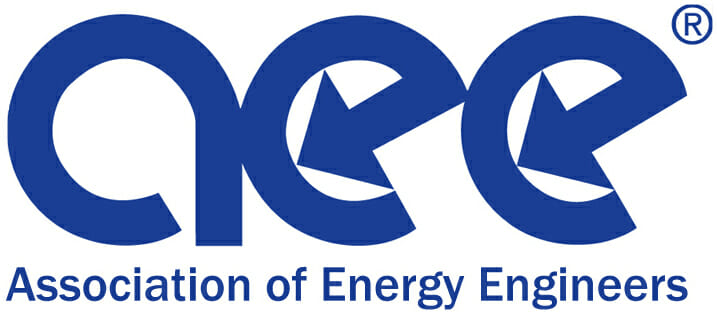


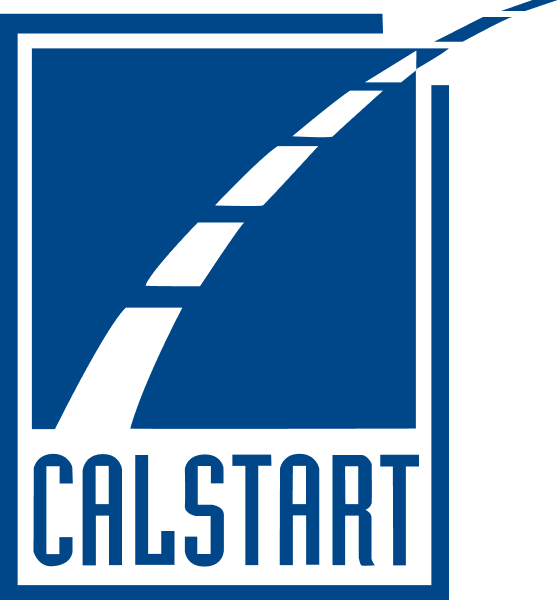




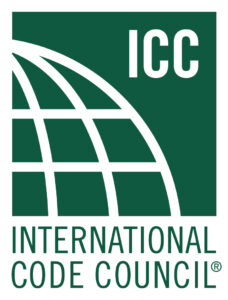













Market Trends & Factbook
The 2025 edition of the Sustainable Energy in America Factbook provides up-to-date, accurate market intelligence about the broad range of industries that are contributing to the country’s move toward more efficient energy usage and cleaner energy production.


